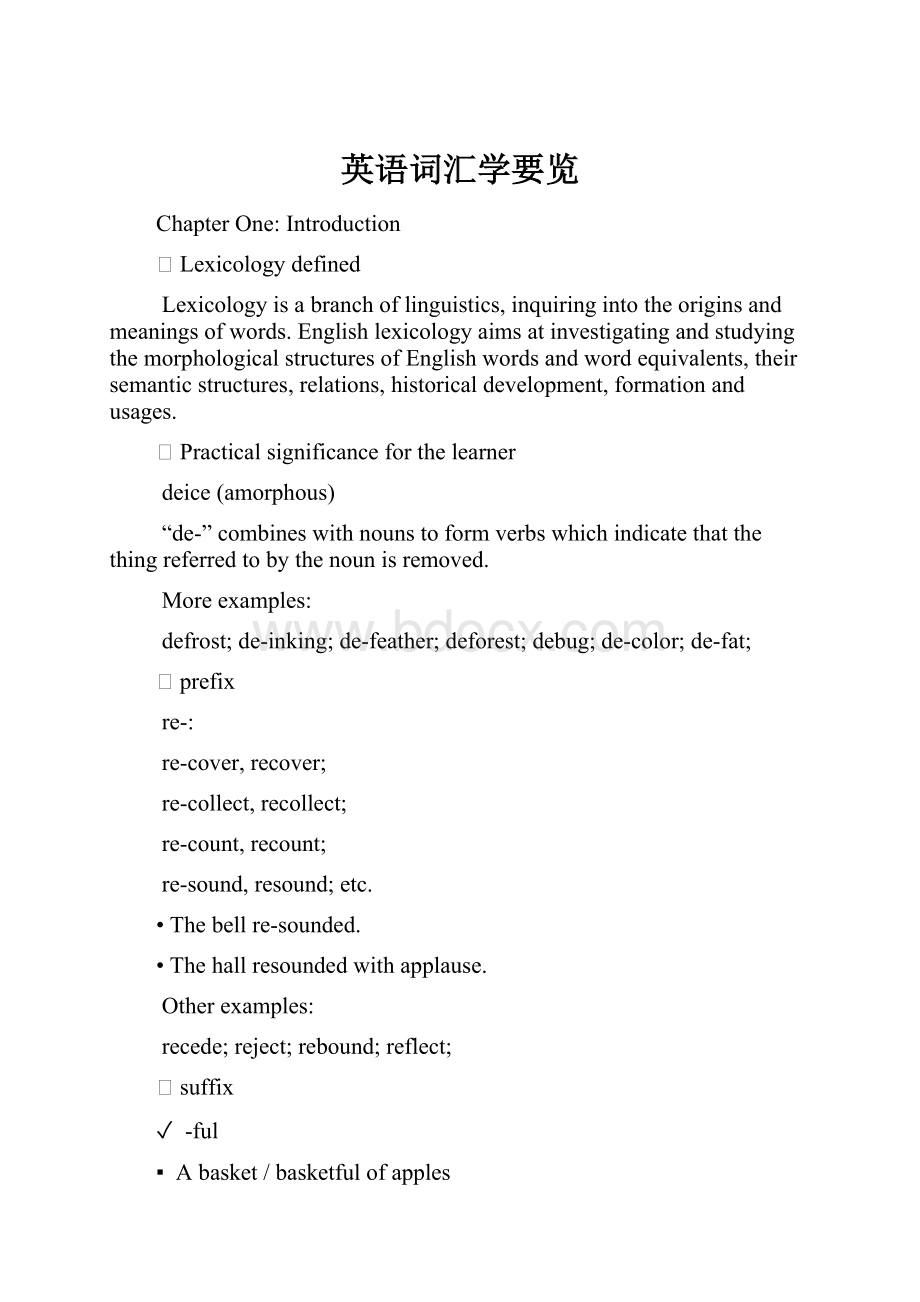英语词汇学要览.docx
《英语词汇学要览.docx》由会员分享,可在线阅读,更多相关《英语词汇学要览.docx(70页珍藏版)》请在冰豆网上搜索。

英语词汇学要览
ChapterOne:
Introduction
ØLexicologydefined
Lexicologyisabranchoflinguistics,inquiringintotheoriginsandmeaningsofwords.EnglishlexicologyaimsatinvestigatingandstudyingthemorphologicalstructuresofEnglishwordsandwordequivalents,theirsemanticstructures,relations,historicaldevelopment,formationandusages.
ØPracticalsignificanceforthelearner
deice(amorphous)
“de-”combineswithnounstoformverbswhichindicatethatthethingreferredtobythenounisremoved.
Moreexamples:
defrost;de-inking;de-feather;deforest;debug;de-color;de-fat;
Øprefix
re-:
re-cover,recover;
re-collect,recollect;
re-count,recount;
re-sound,resound;etc.
•Thebellre-sounded.
•Thehallresoundedwithapplause.
Otherexamples:
recede;reject;rebound;reflect;
Øsuffix
✓-ful
▪Abasket/basketfulofapples
Nounsformedthiswayreferstothequantityoramountofsomethingthatacontainermentionedcanhold.
▪A“spoonful”istheamountofpowderorliquidthataspoonwillhold
▪An“armful”ofsomethingisthequantityofityoucancarryinoneorbothofyourarms.
ØRoot
Freeandboundroot:
eatable;edible
-pos-:
preposition;
deposit;propose;compose;oppose;dispose;expose;interpose;transpose;superimpose
▶-tract-
attract;extract;retract;distract;protract;contract;subtract;detract;tractor
-scrib-
describe;inscribe;prescribe;subscribe;transcribe;circumscribe;(circumlocutioncircumlunarcircumnavigatecircumspect);manuscript;postscript;scribble
-ject-
reject;project;object;subject;inject;deject
-pel-
compel;impel;propel;repel;expel;dispel
ØRelateddisciplines
GeneralLinguistics
Morphology----abranchoflinguisticsinvestigatingwordstructureandwordformationthroughtheuseofmorphemes.
Semantics----thestudyofmeaninginlanguage.Thoughitdealswithmeaningingeneral,itisoftenconfinedtothoseaspectswhicharerelativelystableandcontext-free.Italsogivesmuchemphasistothestudyoftherelationshipsofmeaningbetweenlinguisticsforms;forexample,synonyms,antonyms,andhyponyms.
Stylistics
Itisconcernedwiththelanguageuser’schoiceofproperlinguisticformsinaparticularcontextforspecialeffects.
horse;steed(literary);courser,charger,palfrey(poetic);plug(slang);nag(colloquial);gee(childEnglish)
commence----begin,start
woo,court(outdated,oldfashioned,archaic)
✓Colloquialandslangwords
✓taboowords
✓obscenewords
✓Etymology
thestudyoftheoriginandhistoryofthemeaningandformofwords.
sheep----mutton;pig,swine----pork;ox----beef;calf----veal;chicken----poultry
get;obtain;procure
Phonetics
Lexicography----theoryandpracticeofcompilingdictionaries.Lexicographyprovidestheprinciplesnecessaryfordocumentingthevocabularyofalanguageveryoftenbydrawingonthediscoveriesoflexicologists.
•Christianname
(givenname,firstname,forename)
•Eskimo---Inuit;
•negro(colored)---black;
•Oriental---Asian;
•Crippled---disabled
(differently-abled,physicallychallenged)
•Reptileswereherelongbeforemanappearedontheearth.
man---humanbeing;mankind---humankind;
•history
cf.herstory
(but‘man-made,manpower,etc.’?
)
✓native
•anativeofBoston
•Thisdanceisafavoritewiththenatives.
•NewYorkinthesummerwastoohotevenforthenatives.(referringtothelocalinhabitantsofaparticularplace)
Insomeothercontexts,ithasanold-fashionedfeeland,becauseofbeingcloselyassociatedwithacolonialEuropeanoutlookonnon-whitepeopleslivinginremoteplaces,itmaycauseoffence.
ØSomebasicideasconcerningvocabulary(p.4)
----Thevocabularyofanylanguageneverremainsstable,butisconstantlychanging,growing,anddecaying,togetherwiththedevelopmentofhumansociety.
▪Everyonehastheirownideasaboutit.
▪Haseverybodyeatenasmuchastheywant?
Modifierofabsolutewords(suchasbasic,unique,complete(ly),perfect,full(y),essential,excellent,thoroughly,etc.)
▪Hermostessentialqualityiskindness.(DCE1978)
▪…creatingamoreperfectunion.(AmericanConstitution)
▪Ihaveneverseenamorecompleteinvestigation.(Quirk,1973)
▪Hisviewsonthesubjectaremoreextremethanmine.(ibid)
----Thewordistheprincipalandbasicunitofthelanguage
wordsvslexemes(lexicalunits)
1.Thetermwordisusedinwaysthatobscurethestudyofmeaning.Forexample:
walk,walks,walked,andwalking.
Question1:
Aretheydifferentwords?
Orthevariantsofthesameunderlyingunit,‘walk’?
Question2:
Canwesaythat“thesefourwordsaredifferentformsofthesameword”?
2.Thetermwordisuselessforthestudyofidioms,whicharealsounitsofmeaning;e.g.putforward;kickthebucket
3.Thetermwordhasinanycasebeenappropriateforuseinelsewhereinlinguisticstudy----inthefieldofgrammar,whereitdoessterlingserviceatthejunctionbetweensyntaxandmorphology.
----Thewordisatwo-facetunitpossessingbothformandcontent
----Besideitslexicalmeaning,thewordalsohasitsgrammaticalmeaning
----Englishwordscanbeapproachedbothdiachronicallyandsynchronically
ØSizeoftheEnglishvocabulary(p.6)
a)Dr.SamuelJohnson’sdictionary(1755)contained50,000words.
b)Webster’sThirdNewInternationalDictionary(1983)contains559,000words.
c)TheOxfordEnglishDictionary(thesecondedition1989)contains616,500words.
d)CollinsCobuildEnglishDictionary(1987)hasacoverageof70,000references.
e)TheNewOxfordDictionaryofEnglish(2001)contains350,000words.(thebiggestsingle-volumedictionary)
♣Someinterestingfigures
•Shakespearemadeuseof15,000words;
•Miltonused8,000;
•APrincetonUniversitystudent(upper-classman)hadanaveragevocabularyof16,500words(in1916);
•Asimilartesttenyearslatershowedthatthesameclassofstudentshadavocabularyof17,500;
•AnEnglishmajorisrequiredtohave12,000wordsatgraduation;
•Palmeroffersalistof3,000word-units,whichwouldcover95%ofanytextwrittenineverydayEnglish.
•
DivisionsinthehistoryofEnglish
1.TheOldEnglish(Anglo-Saxon)Period----roughly450to1150
Characteristics:
a.pronunciation:
differingsomewhatfromthatoftheirmodernequivalents;
b.vocabulary:
almostpurelyTeutonic;
c.fullinflections.
2.TheMiddleEnglishPeriod----1150to1500
Characteristics:
a.resemblingModernEnglishmorethanOldEnglish;
b.Withavastnumberofborrowedwords;
c.Gradualdisappearanceofinflections.
3.ThemodernEnglishperiod----1500tothepresent
a)TheEarlyModernEnglish(1500to1700)
b)TheLateModernEnglish(1700tothepresent)
c)ContemporaryEnglish
FeaturesofContemporaryEnglish:
•atrendofsimplicityinstructures;
•fastergrowthandchangeofvocabulary;
•wideuseofcolloquial,slang,andvoguewords.
ReviewQuestions:
1.Whatislexicology?
2.WhatwillbecoveredinthestudyofEnglishlexicology?
3.WhatsubjectsisEnglishlexicologycorrelatedwith?
4.WhyshouldthestudentsofEnglishstudyEnglishlexicology?
Andhowcouldtheybenefitfromit?
5.GiveabriefaccountofthedivisionsinthehistoryofEnglish.
ChapterTwo:
SourcesoftheEnglishVocabulary
ØIndo-EuropeanFamily
(cf.Sino-TibetanFamily)
ThefamilyoflanguagesspokenoverthegreaterpartofEuropeandAsiaasfarasnorthernIndia.
✓Similarityinvocabulary
SanskritGreekLatinItalianFrenchGermanEnglish
matametermatermadreměremuttermother
✓Germanic(sub-family)
1)EastGermanic(Group)----Gothic
2)NorthGermanic
Swedish,Danish,Icelandic,Norwegian
3)WestGermanic
English,High(Low)German,Frisian,Flemish
✓Celtic
Irish,Gaelic,Welsh
✓Latin
Latin,French,Italian,Spanish,Portuguese,Romanian
✓Slavic
Russian,Slovenian,Bulgarian,Czech,Polish,Serbian
✓Baltic---Latvian,Lithuanian
✓Indic---Hindi,Pali,Sanskrit
✓Iranian---Persian,Alfgan
✓Greek,Albanian,Armenian,Tocharian,Hittite
ØHistoryofthePeople(p.3)
•Iberians(3,000-2,000B.C.)
•Celts(the7thcenturyB.C.)
•Romanconquerors(55-54B.C.byJuliusCaesar;43B.C.byClaudius)
•Angles,Saxons,Jutes(the5thcenturyA.D.)
•Scandinavians(the8-9thcentury)
•Normans(the11thcentury)
Renaissance
ElizabethI
TheTudorMonarchy
QueenVictoria
ØElizabethIIListofRoyalHousesofBritain
HouseofNormandy(1066-1154)
WilliamI(theConqueror);HenryI,etc.
HouseofPlantagenet(1154-1399)
HenryII-III;RichardI-II;EdwardI-III,etc.
HouseofLancaster(1399-1485)
HenryIV-VI
HouseofTudor(1485-1603)
HenryVII-VIII;EdwardVI;MaryI;ElizabethI
HouseofStuart(1603-1649)
JamesI;CharlesI
TheCommonwealth(1649-1660)
OliverCromwell(LordProtector);RichardCromwell
HouseofStuart(1660-1714)
CharlesII;JamesII;WilliamIIIandMaryII;Anne
HouseofHanover(1714-1910)
GeorgeI-IV;WilliamIV;Victoria;EdwardVII
HouseofWidsor
GeorgeV;EdwardVIII;GeorgeVI;ElizabethII(1952-)
ØTheNativeElementinModernEnglish(p.9)
•Beforeabout450A.D.,therewasnoEnglishlanguageinBritain.
•Wordsofnativeoriginconsistforthemostpartofveryancientelements---Indo-European,GermanicandWestGermaniccognates.
•Besides,anumberofScandinavian,LatinandFrenchelementshavebecomepartoftheEnglishbasicstockofwords.
•Thenativestockofwordsisestimatedtomake25-30%oftheEnglishvocabulary.
ØSemanticfeaturesofwordsofAnglo-Saxonorigin
a.thenumeralsuptoathousand;
b.themostintimatefamilyrelation